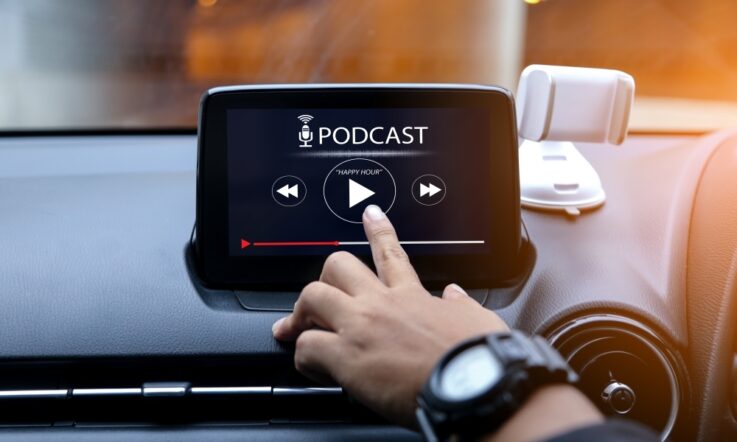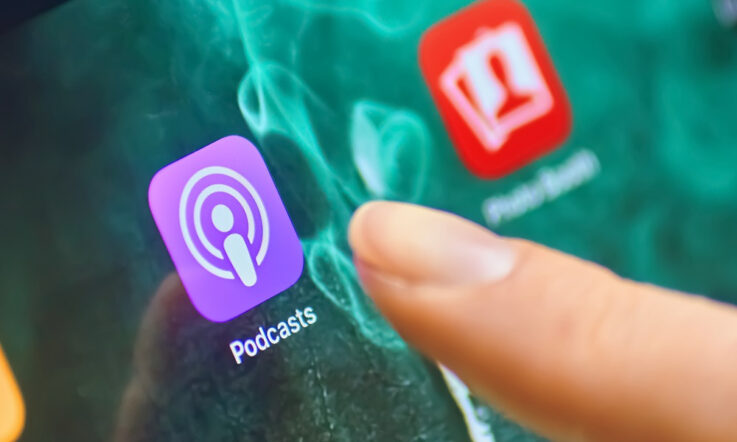This podcast from Teacher is supported by the Victorian Government. Generous financial incentives are available for qualified early childhood teachers and educators to join or re-join the sector in Victoria.
Rebecca Vukovic: Hello and thank you for downloading this podcast from Teacher magazine – I’m Rebecca Vukovic.
Dominique Russell: And I’m Dominique Russell.
RV: Another year is coming to a close and it’s time to look back on some of our podcast highlights of the last 12 months. Throughout this episode, we’ll be reflecting on some of our favourite podcast interviews this year, and share our top 3 personal favourite episodes from 2022. For me, this podcast recording feels totally different to the others we’ve done in the past because I’ve spent the past 12 months on parental leave, so I haven’t done a podcast interview this year at all! But, I have been listening from home or while I’ve been driving or exercising. It’s been wonderful listening to all the interesting episodes you’ve recorded.
DR: We’ve certainly had the pleasure of welcoming so many interesting guests on the podcast this year from all over the country, and some international guests too. It’ll be great to cast our minds back in this episode and, of course, if you’re interested in listening to the full episodes of anything we mention today, you can listen back to them directly from our podcast feed, or access the episode transcript on our website, teachermagazine.com
RV: Okay let’s jump into the highlights now. My first podcast highlight is in fact an entire podcast series – the School Assembly series that launched earlier this year. In case you haven’t heard about it, School Assembly follows Dayton Primary School’s Principal Ray Boyd and Associate Principal Rachael Lehr as they navigate the exciting and challenging journey of building a new school community from scratch. Zoe Kaskamanidis hosts the series, and chats with Ray and Rachael each month to get updates and reflections on their progress. To date, they’ve covered setting short- and long-term goals, planning, recruiting a foundation staff, dealing with challenges or unexpected hurdles, connecting with the community and so much more! I’d like to throw to a short clip from Episode 4 in the series, it’s both Ray and Rachael talking about how when they first started promoting the school, they were printing out flyers and walking around the suburb of Dayton handing them out to families. Here’s Ray discussing why they decided to do that in person.
Ray Boyd: I guess there were 4 reasons for that. The first one was what you’ve already touched on – it was a chance to actually get out in the community and get a feel for the demographic and get an understanding of the development that’s going on and the potential for future development.
And as a result of that, Rachael and I worked out that there’s actually going to be a big growth later on next year, as the land gets cleared and further developed. The second reason is to provide an opportunity for us to actually speak with people, and we met a few. I think Rachael actually spoke to more families than I did. And also to promote the school and what was coming and to get them involved in it.
It allowed us really to get a better understanding of our intake area. So, we could see when someone spoke to us on the phone, we had a rough schematic in our head of where they were based anyway. So, it gave us a general feel for it.
And probably the biggest reason is we didn’t have any money.
Rachael Lehr: Exactly, we’re broke, so using our own leg power rather than getting it delivered was a lot cheaper of an option. Plus, we got some exercise in there as well so that was always an added bonus.
DR: I’m really glad you chose this series to highlight, and that clip there is such a wonderful reminder of the important contribution the broader community can have in building and sustaining a school culture. It’s also a really great example of how a quite ordinary and simple activity, like distributing flyers, can be rethought to be a really purposeful and meaningful task.
Time for my first highlight now and it’s an episode from back in April when I spoke with Dr Ilana Finefter-Rosenbluh, a Lecturer in the Faculty of Education at Monash University. We spoke about some recent research of hers that delved into how teachers utilise data from student perception surveys.
It stands out to me because it was a really interesting discussion, I think mostly because the value of seeking student feedback is spoken about so often, but the barriers teachers face when trying to utilise this feedback, and also the factors that enable teachers to be able to respond to feedback, is really an important part of the discussion, but perhaps one that isn’t touched on as much.
Ilana shared some fascinating insights on these aspects – for example, that although teachers found the insights provided by these student perception surveys to be insightful, that they were overwhelmed by all of the data and they weren’t sure how to act on it. And also, that collaborating with colleagues is an impactful strategy for acting on student feedback. If you’d like to look up the episode to listen to it in full, it’s Episode 38 of our School Improvement series, and it’s titled Acting on student feedback.
Right now, though, I’d like to share a clip where Ilana expands a little more on why collaboration with colleagues in this area is key. Here’s Ilana:
Ilana Finefter-Rosenbluh: So, schools and educators, I would say they, could greatly benefit from the integration of systematic learning from both challenging and successful experiences with student surveys. Teachers can develop their capacity to promote students’ experiences by, I would say, working more collaboratively with their colleagues, hearing about their feedback, learning from their practices.
So, there is nothing new under the sun. They all got this feedback, and they can unpack it together, and they can give advice to each other and they can support each other; and one may have some really great ideas when it comes to belonging, and the other may have some wonderful things to share when it comes to pedagogical effectiveness. So, we just need to make sure that we collaborate, and we have this dialogue and support each other.
RV: There’s some really powerful advice there about collaboration and supporting each other through the process. For schools using student perception surveys, it’s really essential that they have those structures in place for utilising the data that comes from them. This episode definitely gives listeners some insights into how to support staff to act on student feedback, which is obviously great.
Before I share my next highlight though, here’s a quick message from our sponsor.
Victoria needs more Kinder teachers and educators. Make the move and you’ll be rewarded with $9000 plus relocation support. So now you can turn a rewarding career into a great adventure. Learn more at vic.gov.au/kinder Best start, best life. Authorised by the Victorian Government, Melbourne.
Moving on now, my second highlight is actually another one from Zoe, it’s an episode from our Action Research series. In this podcast, she’s joined by Sarah Durack, a secondary Science and Mathematics teacher based in Sydney. What makes this story so impressive is that Sarah finished her Honours thesis on the topic of school to university transition while working a full-time teaching job. In her discussion with Zoe, Sarah shares what it was like to juggle this workload and offers some tips for educators who may be interested in pursuing research themselves.
Here's a short clip from the episode. It’s Sarah discussing what it’s like being a teacher by day and a researcher by night.
Sarah Durack: If you ask people who know me well, I think they would say that it was a bit of a bonkers decision. And at times I definitely thought that myself. Schools aren’t really set up to accommodate this sort of thing, where you’re researching part-time as well as working full-time. I just don’t think it’s that common, so I don’t think there are systems and processes in place to support people who are doing this sort of extra load.
I found that the slow burn was definitely the way to go. If I chipped away on the project on weekends, it sort of got done over a number of weeks – the different bits I had to worry about, I suppose.
But I found during reporting periods and other really intense times at school, the project would get shelved. And vice versa during school holidays I got heaps of time to work on it and I made really big leaps during those periods. And, yeah, towards the end of the project I was working on it pretty constantly, which required family and friends to have a bit of understanding that I would be living under a rock for a while until I resurfaced with the thesis complete, and the talk done and the viva done, so yeah. It was a time. But it was really worthwhile and I’m so glad that I did it.
DR: I’m sure any teachers listening to this episode who are looking towards 2023 and might be considering conducting their own action research or further study will be adding this episode to their holiday listening list. Sarah shares some brilliant advice in the interview and also shares the details of her thesis findings which were really interesting, too.
My next highlight is from part of our annual coverage of ACER’s Research Conference. I was joined by 2 guests all the way from the US – Louisa Rosenheck who is the Director of Pedagogy at the game-based learning platform, Kahoot!, and YJ Kim, Assistant Professor of Design, Creative, and Informal Education in the Department of Curriculum and Instruction at the University of Wisconsin-Madison. If you’d like to catch up on it, it’s Episode 76 in our Research Files series.
They presented a session at Research Conference titled Playful assessment: Don't stop the fun, and joined me a few weeks prior to give us a taste of what they’d be sharing with delegates. It was such an interesting conversation – again, like my last highlight, because it was looking at a topic that’s spoken about a lot, in this instance, game-based learning, in a bit of a different way – which, in this case, was game-based assessment. In particular, I’d like to highlight the section of the episode where YJ and Louise explain why embedding assessment in playful activities is key, rather than tacking on a more ‘traditional’ assessment to the end of a unit:
YJ Kim: So playful assessment can help teachers to think about ‘what are really the outcomes that I care about as a teacher?’. And then ‘how can I foreground that in this authentic, playful experience?’ and then they can think about, ‘OK, how can I make sense with what I observed with this?’. And I think that those are the kind of affordances of playful assessment and that the part of kind of embedding that assessment piece in the playful activity is the key piece of this.
Louisa Rosenheck: Yeah. And just to emphasise a little bit, one part of that. You know when students are doing, for example project-based learning or maker projects, it would not feel authentic to do a whole big project and show these skills and then have to do another assessment where you have to show those skills again, but in a more contrived setting, right? So, in the real world you don't stop and then take a test, your work is demonstrating your skills, and so that's what we want with playful assessment and with student-centred assessment as well.
RV: They raise such interesting points and I think it really encourages teachers to think about their own approach to assessment – you know, are they integrating playful assessment into their classroom lessons or are they using a more traditional assessment technique? Perhaps they’d never even considered this playful assessment approach. This episode is definitely worth a listen!
Okay so my final highlight of the year is in fact a podcast special hosted by Teacher editor, Jo Earp. In this episode, she gathered a panel of experienced teachers and leaders to share their priorities, strategies and tips for those first few weeks of a new school year. It’s timely that we’re looking back on it now, as some of you may be starting to think and plan for the 2023 school year. In the episode, there’s some great advice on things like classroom displays, professional learning needs, authentic activities, positive behaviour management, and keeping on top of your email inbox, amongst many others.
In this clip, Rebecca West, Deputy Principal at Bonnyrigg Public School in New South Wales, is talking about classroom management.
Rebecca West: If anyone tells you ‘don’t smile until April’, don’t listen to them. I can’t believe people at universities are still teaching this. You can smile at your kids and still set very explicit expectations for behaviour in the classroom. And that would be my next key – setting expectations and being very explicit and clear about it and sticking to it.
If you’re going to tell the kids that this is the expectation and that there is a consequence or whatever for not following that expectation, follow through with it. Call home, talk to the parents, build that relationship early and make sure that kids know that what you say goes, because they will follow it. Kids love boundaries – you don’t think they do, but they actually really do thrive on knowing what the limit is and how they can be successful in the classroom. So, don’t worry about rushing to the curriculum, take time to set the expectations and build the relationships and then the curriculum will follow.
DR: You’re right about this episode being a great one to listen to when planning for the new school year, and I’m sure that will be the case for years to come. So we just heard Rebecca’s advice there, but in the episode we also shared the advice and perspectives of Holly Wedd (formerly Holly Millican) who our listeners will probably recognise from her regular videos on our YouTube channel where she shares learning activities for Mathematics. You’ll also hear from Nicole Wilson and David Webster, Assistant Principal and Acting Principal at East Derwent Primary School in Tasmania; Lisa Seewraj from Child Side Playgroup and School in Western Australia; and Alex Wharton, Head of Middle School at Carinya Christian School in New South Wales. It’s such a great episode.
Now to finish off the episode with my final podcast highlight for 2022 – it’s a lovely conversation with Principal Trent Cowley about the work he’s doing at Kingston State School, a primary school in Queensland. We spoke about his work as Principal and how the school successfully increased student achievement in reading and writing in an 18-month period.
He also shared what it means to him to be a visible leader and the case management system the school has implemented to improve student outcomes. To listen to the full episode, just look up Episode 41 in our School Improvement series. What I’d like to highlight with you here, though, is a snippet from Trent on how and why he collaborates with other principals in the area. Here’s Trent:
Trent Cowley: So we meet together twice per term as principals and our common goal is to improve the outcomes of all of our students across all of our schools. And we can do that collectively by working and sharing best practice across the 11 schools. We have subclusters that are within our cluster – so our Deputy Principals meet, our First Nations representatives meet and our inclusive practices representatives meet as well. So they’re the 3 sub-clusters that meet that are also having a little bit more of a targeted and sharp and narrow focus, and they report back to us as a group of principals. So collectively when we work together we can have that intentional collaboration and that collective efficacy that's going to ultimately result in our students progressing.
RV: That’s it for our podcast highlights special of 2022. Thanks to all our guests and sponsors, and of course you, our listeners for all your support over the last 12 months and for being a part of the Teacher community. If you’re new to Teacher, or you just want to do some binge listening over the holidays, you can access our full archive – that’s the Behaviour Management series, School Improvement, The Research Files, Teaching Methods, Action Research, Global Education, our monthly Teacher Staffroom catch ups, and the special episodes that we do. You just need to go to the podcast tab on teachermagazine.com or you can find us wherever you get your podcasts from. We hope you have a wonderful holiday break.
You’ve been listening to a podcast from Teacher supported by the Victorian Government. Generous financial incentives are available for qualified early childhood teachers and educators to join or re-join the sector in Victoria.



